Black History Month: “There is still more work to be done”
- 28 min. read ▪ Published
To honor Black History Month 2022, we asked Black members of the UC Berkeley School of Public Health community what the month means to them. The answers we received were thoughtful, nuanced, emotional, and joyful. Click through the links to see our participant’s full thoughts on Black History Month, Black Lives Matter, Black experience in health care, and what UC Berkeley and Berkeley Public Health can do to amplify Black voices.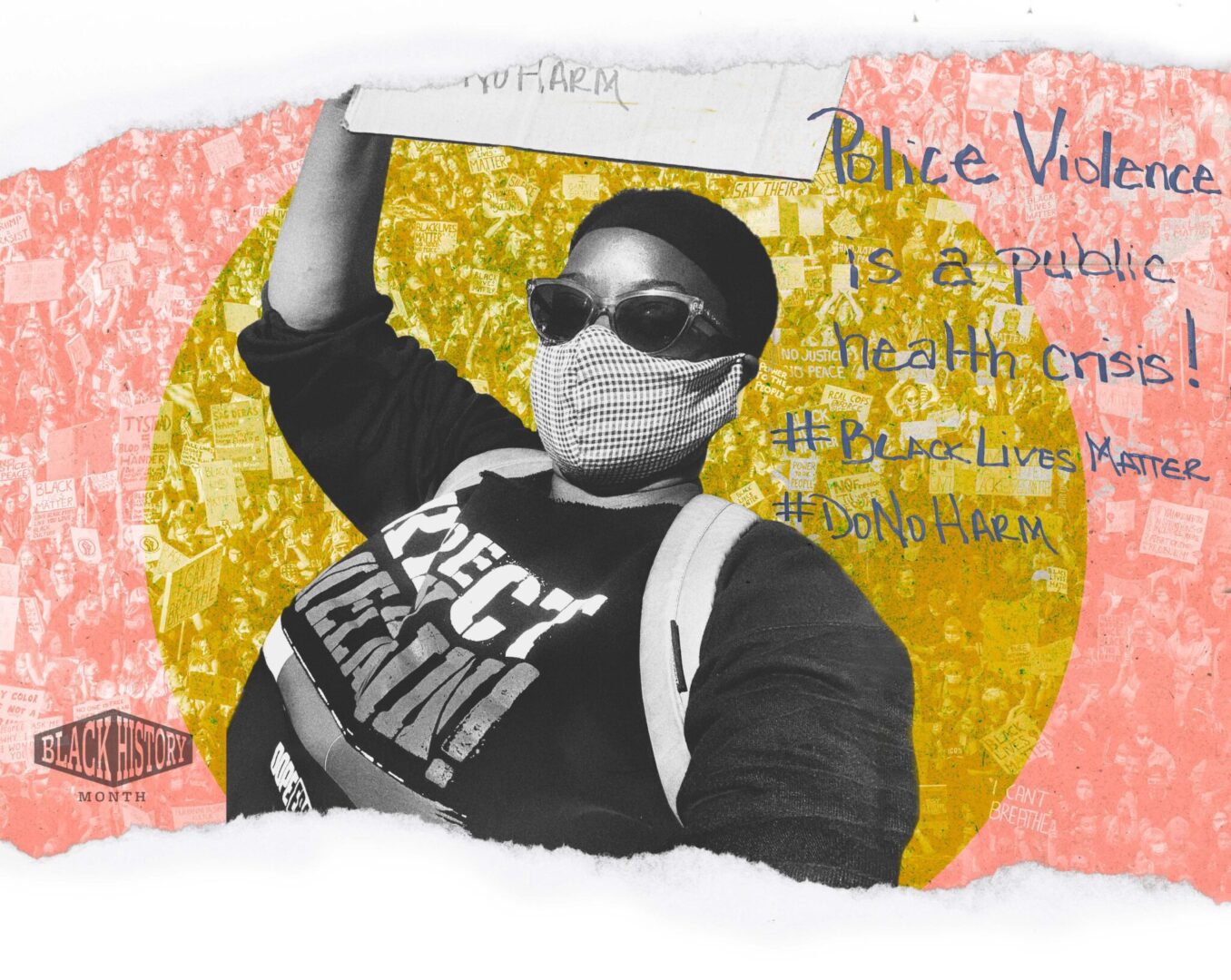
Ché L. Abram, MBA
Chief of Diversity, Equity, Inclusion, and Belonging
Black History and Black Future Month has become such an important month to me because it gives me a chance to recognize the extraordinary resilience and joy of my community amid the continuous soul-wrenching fight to be valued. It reminds me that I have something so inexplicably marvelous that it permeates every aspect of my life and is what makes me both uniquely me and binds me to my global community.
Black Lives Matter has positively impacted my frame of Black History Month because so much beauty has erupted out of it, one of my favorites being: Oakland’s Black Joy Parade. It means self-care as a form of resistance (Audre Lorde), thriving Black communities and businesses, policy change, awareness, Black arts in their fullness and honesty, community connection, and feeling nurtured. As a person living Black Lives Matter every day, I have to come from a space of love otherwise it will eat me alive.
Berkeley Public Health (BPH): What pronouns do you use?
Ché L. Abram: She/her/hers
BPH: What is your role here at Berkeley Public Health?
Abram: Chief of Diversity, Equity, Inclusion, and Belonging
BPH: What does Black History Month mean to you?
Abram: Black History and Black Future Month has become such an important month to me because it gives me a chance to recognize the extraordinary resilience and joy of my community amid the continuous soul wrenching fight to be valued. It reminds me that I have something so inexplicably marvelous that it permeates every aspect of my life and is what makes me both uniquely me and binds me to my global community.
BPH: How has Black Lives Matter changed how you see or feel about Black History Month?
Abram: Black Lives Matter is a culmination of over 400 years of Black resistance through so many avenues from protests to parades. The movement has positively impacted my frame of Black History Month because so much beauty has erupted out of it, one of my favorites being: Oakland’s Black Joy Parade. It means self-care as a form of resistance (Audre Lorde), thriving Black communities and businesses, policy change, awareness, Black arts in their fullness and honesty, community connection, and feeling nurtured. As a person living Black Lives Matter every day, I have to come from a space of love otherwise it will eat me alive.
BPH: How do you feel the history of the Black experience in healthcare and public health can be better disseminated?
Abram: We can teach the history each and every day, yet, it is the lived experiences that often jolt us into action. Education about the “white gaze” and “savior syndrome” need to be discussed in addition to these histories, because the community has been thriving despite their environments. I believe, in public health and healthcare, like how the murder of Oscar Grant and Trayvon Martin lit the fire for Black Lives Matter, people need physical exposure through personal story telling, to walk the streets, listen to understand and work side-by-side, not to assume or prescribe.
BPH: How do you think UC Berkeley can amplify the voices of our Black community members?
Abram: To amplify Black community members means to deconstruct the very essence of how the University structure and environment move and breathe; then rebuild something new. There is so much about academic institutions that was not designed for us and upholds practices that are harmful to us despite our willingness to bend to fit the crooked room (Melissa Harris Perry, Sister Citizens). Amplifying our voices is a bandaid on a structural issue.
Yet, to best address the question as a Black Woman:
- It’s having more than one or two Black members of the Chancellor’s Cabinet or in positions of leadership around campus.
- It’s having a policy, process, and practice that thoroughly examine racially based discrimination versus leaving it to the discretion of various parties to decide the outcomes.
- It’s stating the harms the University has done to the Black campus community and setting a timeline to mitigate and heal those harms.
- It’s recognizing that some equity policies are not designed to include the copious amounts of invisible labor that Black leadership, staff, faculty, and students do on a daily basis because there are so few of us in this space. Example, Dr. Nadine Burke Harris, the first California Surgeon General, just stepped down from her role after two years to practice self-care.
- It means funding and institutionalizing anti-racism and equity and inclusion at the same levels as funding and institutionalizing human resources, IT, or finance departments.
- It means when Black people come to you with an issue, it is a culmination of events that have occurred, not just one incident.
- It means when Black people give you feedback, it is a gift of growth because of the constant rumination and coaching we have had to experience in order to summon the courage to give you that feedback.
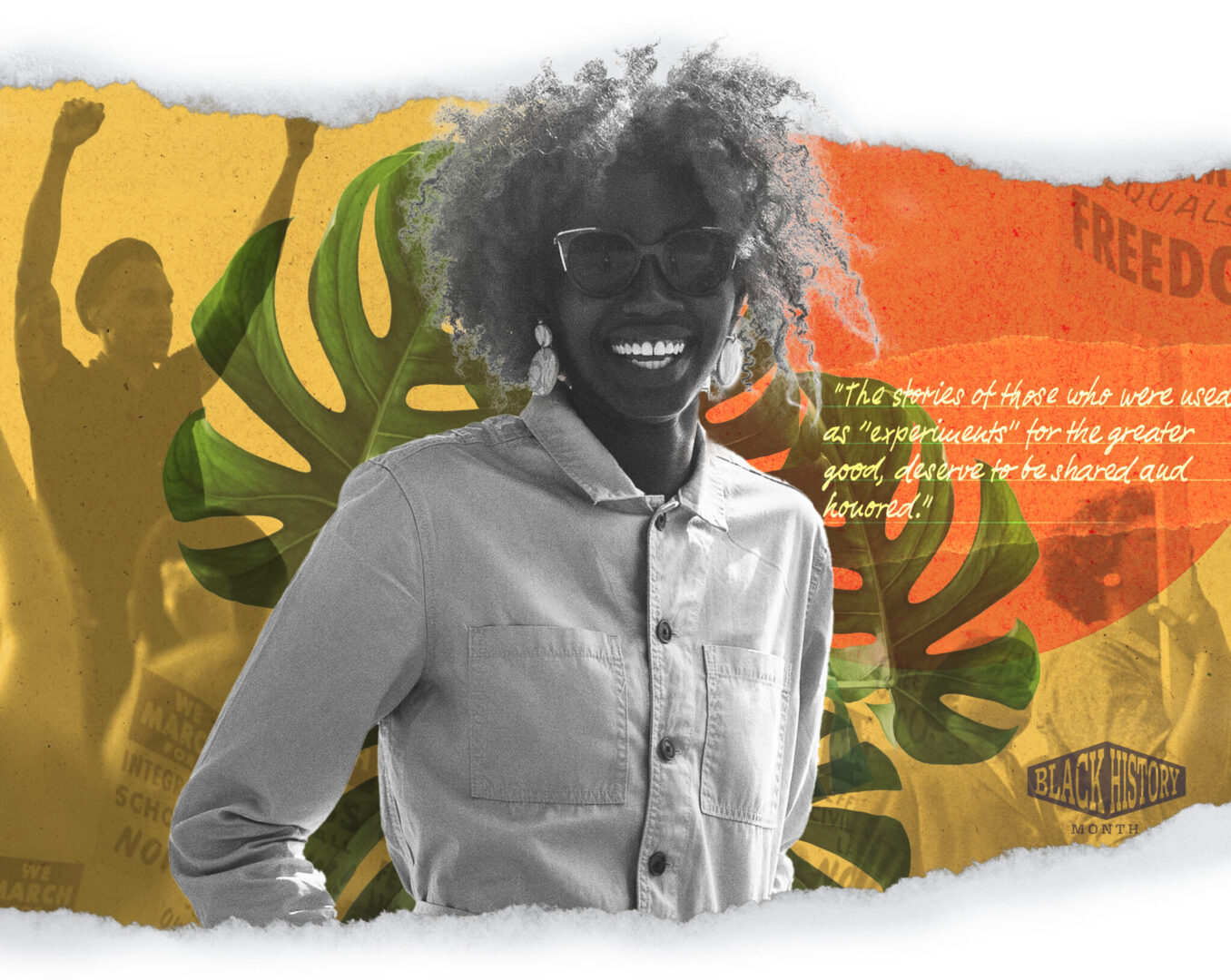
Abena Asare
MPH candidate ’22, Maternal, Child, and Adolescent Health Concentration; GRADS Coordinator for Berkeley Public Health’s DREAM Office; President of the student group Black Advocates for Equity in Health.
For me, Black History Month is a time of deep reflection. It is also a time of celebration; a time to recognize and show massive love to everything that is connected to Black culture And it’s a time to remember and show gratitude for all that my community—both past and present—has done to get us to this point.
BHM also serves as a reminder that there is still more work to be done. BHM to me is an indicator that the job is never finished; that there were people before me who fought for me to be where I am, and that I have a duty to continue to push for change for those who come after me. I will continue to celebrate Black History all 365 days of the year and I hope that those around me continue to amplify the voices of Black folks all year, not just during the month of February.
I think it is important to acknowledge the history of the Black experience to get a better understanding of why and how Black folks interact with these (health care and public health) systems today. The reality is that racial disparities have existed and continue to persist, disproportionately impacting Black people in the US and around the world. From the origins of American gynecology to the Tuskegee Syphilis study, we know that many of the advancements in health care and public health arose as a result of work done on and to Black bodies. The stories of those who were used as “experiments” for the greater good, deserve to be shared and honored.
Berkeley Public Health (BPH): What pronouns do you use?
Abena Asare: She/her/hers
BPH: What is your role here at Berkeley Public Health?
Asare: I’m a second year MPH student in the Maternal, Child, and Adolescent Health concentration. I also serve as a GRADS Coordinator for the DREAM Office and as the President for Black Advocates for Equity in Health (BAEH), a student group within SPH.
BPH: How do you feel the history of the Black experience in health care and public health can be better disseminated?
Asare: First and foremost, I think it is important to acknowledge the history of the Black experience to get a better understanding of why and how Black folks interact with these systems today. The reality is that racial disparities have existed and continue to persist within health care/public health, disproportionately impacting Black people in the US and around the world. The inequitable systems that exist today didn’t happen overnight and I believe unpacking the history of how and why we got to this point is essential. From the origins of American gynecology to the Tuskegee syphilis study, we know that many of the advancements in health care and public health arose as a result of work done on and to Black bodies. The stories of those who were used as “experiments” for the greater good, deserve to be shared and honored. With this knowledge, it is important to own and recognize the harm that has been done and continue to actively take steps towards ensuring change for communities that have been negatively impacted by this work. We need to continue to listen to the voices that have continually been left out of the narrative.
BPH: What does Black History Month mean to you?
Asare: For me, Black History Month is a time of deep reflection. It is also a time of celebration; a time to recognize and show massive love to everything that is connected to Black culture. Yet, it is also a time to remember and show gratitude for all that my community—both past and present—has done to get us to this point. BHM also serves as a reminder that there is still more work to be done. Issues such as systemic racism still transpire in today’s world, and Black people still find themselves fighting against these injustices. Therefore, BHM to me is an indicator that the job is never finished: that there were people before me who fought for me to be where I am, and that I have a duty to continue to push for change for those who come after me.
BPH: How has Black Lives Matter changed how you see or feel about Black History Month?
Asare: Personally, it hasn’t really changed much. Being Black is part of my identity and I grew up in a household where we were taught to take pride in our Blackness and that pride became even more essential with the BLM movement. It’s hard to believe that it has been almost a decade since the BLM movement was started, but the last few years or so has taught me that we’re still fighting for our lives to be valued. Black Lives Matter brought to light the injustices I had seen and experienced my whole life, and I was grateful to have more allies in my corner who were now seeing and actively learning about what I and others experience daily. I’m hopeful that there is a brighter future ahead for all because of it. I will continue to celebrate Black History all 365 days of the year and I hope that those around me continue to amplify the voices of Black folks all year, not just during the month of February.
BPH: How do you think UC Berkeley can amplify the voices of our Black community members?
Asare: UC Berkeley can amplify the voices of our Black community members by being intentional in providing opportunities and spaces where Black folks feel comfortable being their whole selves. Many times, members of the Black community are the minority in comparison to our white counterparts and classmates. Therefore, space must be given to us to truly express and share how we feel and what we want to see from institutions such as UC Berkeley. Part of being an ally to me is being willing and able to take a step back, listen, and see how one can make room for those who they want to support. UC Berkeley simply has to step out of the driver’s seat in certain regards and allow for Black community members to transparently share their experiences, concerns, and hopes.
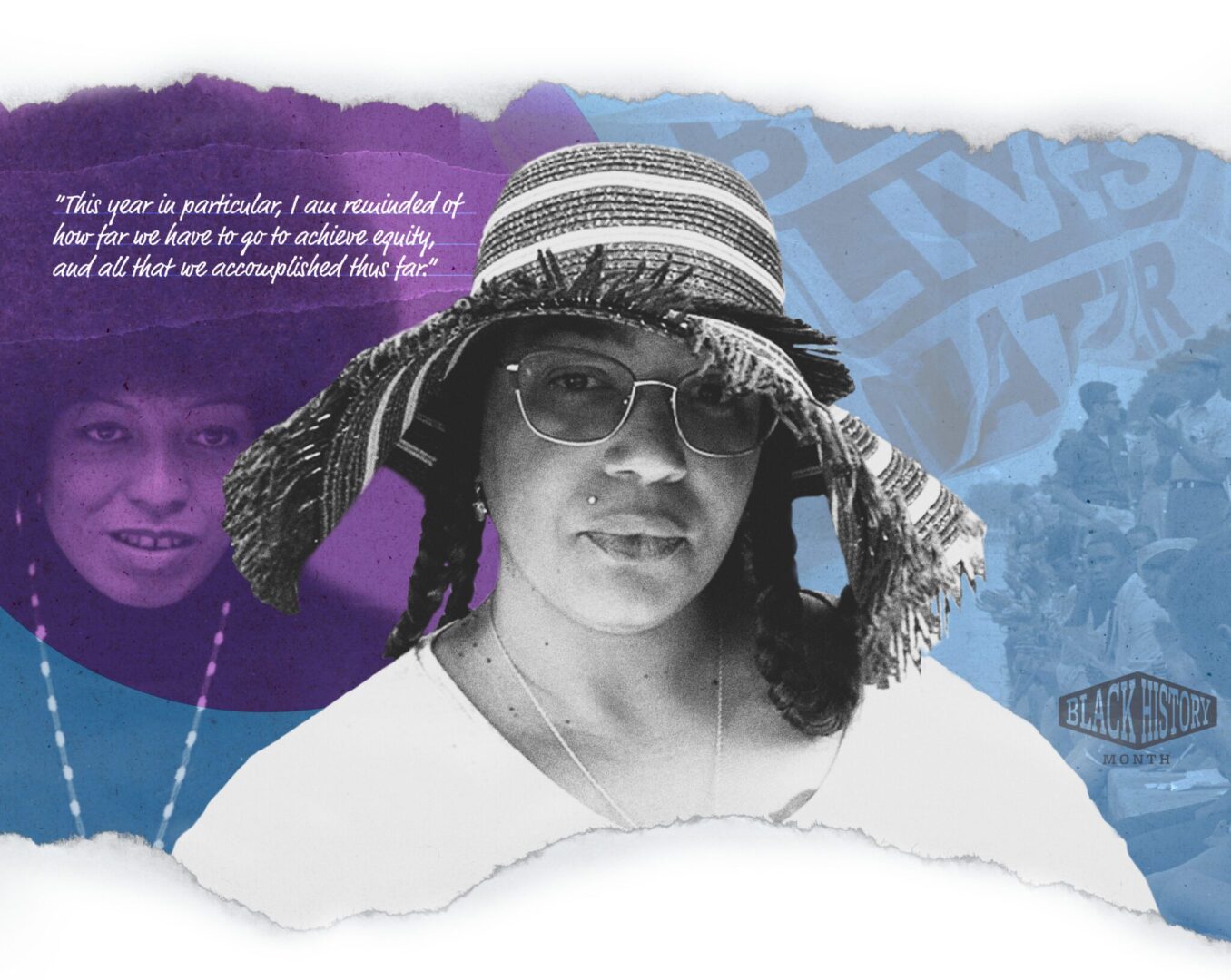
Gina Grayson
Center for Occupational and Environmental Health Business Operations Manager
This month means so many things to me. I look forward to this month every year because we have a wider audience to share our stories, both past and present, with those who may not otherwise take notice of our cultural richness. We are often provided opportunities to have hard conversations during this month that may never take place without the inadvertent hyper awareness that comes with Black History Month. I find myself analyzing race relations in the US regarding the state of Black lives as a whole.
Not one year goes by that I do not count myself extremely grateful for the sacrifices from my ancestors, and all those before us who put their lives on the line to ensure we have a more equitable future. This year in particular, I am reminded of how far we have to go to achieve equity and all that we accomplished thus far.
Berkeley Public Health (BPH): What pronouns do you use?
Gina Grayson: She/her/hers
BPH: What is your role here at Berkeley Public Health?
Grayson: My main position requires me to manage all business aspects of the Center for Occupational and Environmental Health (COEH) by overseeing our grants, finances, and all aspects of our NIOSH training grant for graduate trainees in Occupational Health. I also sit on the Staff Advisory Council (SAC) and SAC Events committees.
BPH: What does Black History Month mean to you?
Grayson: This month means so many things to me. I look forward to this month every year because we have a wider audience to share our stories—both past and present—with those who may not otherwise take notice of our cultural richness. We are often provided opportunities to have hard conversations during this month that may never take place without the inadvertent hyper awareness that comes with Black History Month. I find myself analyzing race relations in the US regarding the state of Black lives as a whole. Not one year goes by that I do not count myself extremely grateful for the sacrifices from my ancestors, and all those before us who put their lives on the line to ensure we have a more equitable future. This year in particular, I am reminded of how far we have to go to achieve equity and all that we accomplished thus far.
BPH: How has Black Lives Matter changed how you see or feel about Black History Month?
Grayson: Black lives have always mattered, but a slogan/tagline/corporation had to be created to break it down to its most simplistic base—to remind others in this country and this world—that Black lives always have, and always will, matter. The unity of parts of the Black community through “Black Lives Matter” comforted me and gave me hope. Alternatively, I was devastated when we were countered with “Blue Lives Matter” and “All Lives Matter.” Now, this phrase carries many emotions, but I will always celebrate the fact that Black lives matter—that my life matters. Black History Month remains a beautiful and reflective time of year for me, regardless of personal interpretation or politicization of BLM, because it’s a part of who I am, and it reminds people that I exist.
BPH: How do you feel the history of the Black experience in health care and public health can be better disseminated?
Grayson: My answer depends on who we are disseminating this information to. The system needs to acknowledge the horrific historical atrocities that happened to/were experienced by African Americans. We have a responsibility to make sure all community members are educated about health care and public health, but it has to be done at all levels. When there are more people that look like our community and advocates of our community wearing white coats, there will be a greater opportunity to discuss the importance of health care, especially preventative care that might not take place otherwise. The health care system needs to reorganize their approach in a way that every person, regardless of color, gender, etc., gets the respect and treatment they need and deserve. We need to remind people of the “care” in health care. Changing a system is hard, but empowering patients to speak up for their health and meaningfully question decisions can help our community gain greater control over choices made on behalf of their health.
BPH: How do you think UC Berkeley can amplify the voices of our Black community members?
Grayson: The process has already started with the invitation to staff to join racial justice/antiracism training, which enables us to share our truth and personal experience with others. Another opportunity to raise our community up is by hiring more of us into the school, and into UC Berkeley as a whole, to better reflect the community we serve, and those we hope to serve. When we create a community that truly includes people from all backgrounds, we all have a voice. One hundred voices united together will always be heard over one or two voices yelling at the top of their lungs. We need to encourage faculty and those in power to welcome those we are trying to serve at the table, ask about their needs and how they can be supported to make sure Black voices are fully included in meetings and conversations that directly impact all of us.
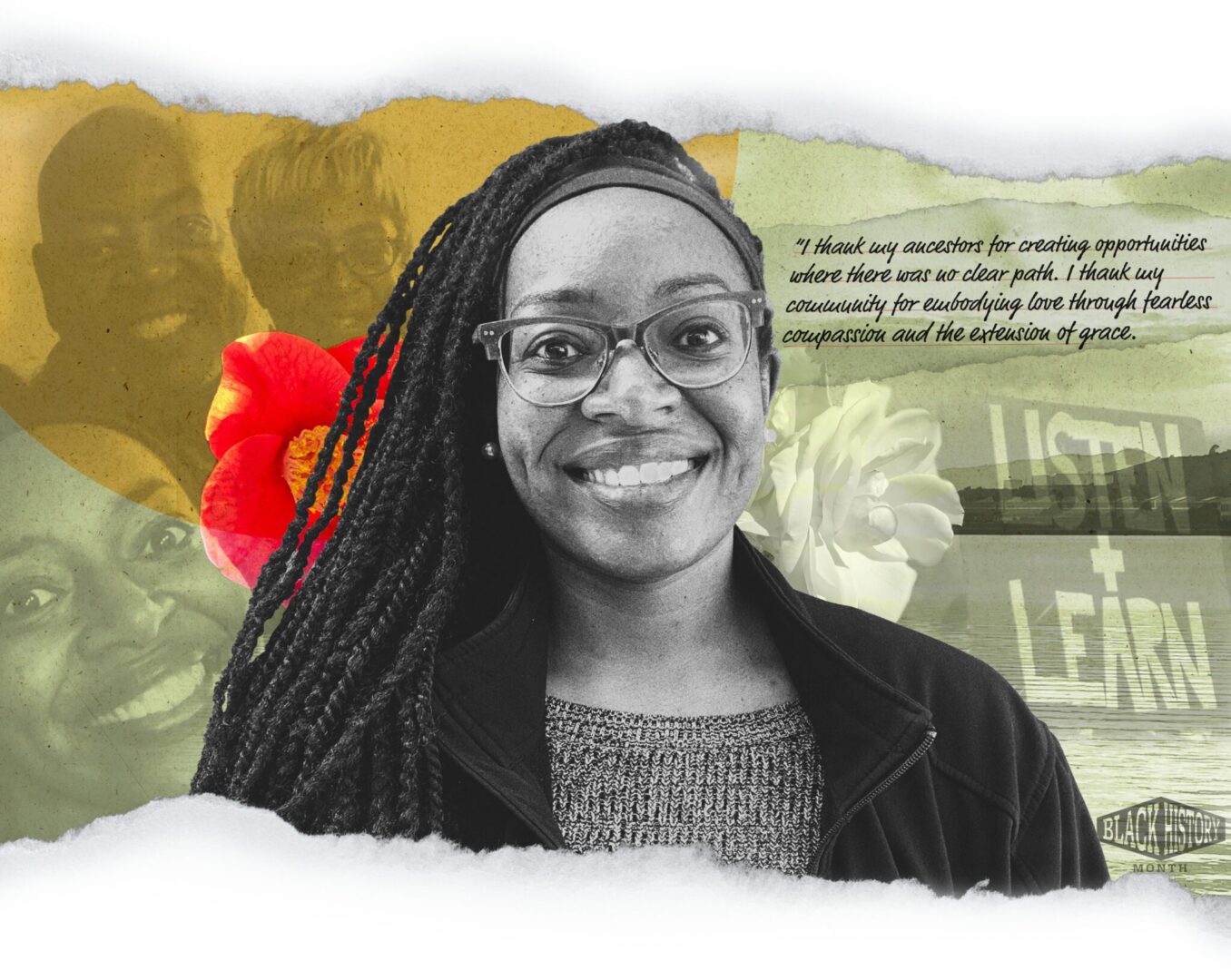
Brittany Campbell
First year DrPH candidate
Black History Month is a time to focus on the roots, flowers, and seeds.
To me, the roots represent the past. I honor my roots by honoring my ancestors and remembering stories of resilience and community organizing. I do this while holding my hometown (St. Louis) close to my heart.
Flowers represent what’s blooming now. Flowers remind me to practice gratitude in the present. I thank my ancestors for creating opportunities where there was no clear path. I thank my community for embodying love through fearless compassion and the extension of grace. I practice gratitude for the intersection where my faith meets courage, moving me through my journey in the world.
Seeds represent what’s to come, the future. This focus requires intentionality. Creating a just future requires imagination skills, hope, steadfast faith, and an eagerness for change. I use Black History Month (and quite honestly, every month) to honor my past, appreciate the present, imagine a more just society, and act in a way that is aligned with personal and collective goals.
Berkeley Public Health (BPH): What pronouns do you use?
Brittany Campbell: She/her/hers.
BPH: What is your role here at Berkeley Public Health?
Campbell: I am a scholar in the Doctor of Public Health program. I also serve in the role of community member, holding memberships to several communities across geographies. I am here to shed light on the deep-rooted, complex social issues that impact our health. My role is to be open to new experiences and ways of knowing (perspectives). Most importantly, I am here to honor my ancestors. I am here to offer a perspective that merges my knowledge, wisdom, and lived experience with the intent to inform interventions, programs, and policies that center resilience, joy, and community gifts (assets).
BPH: What does Black History Month mean to you?
Campbell: Black History Month is a time to focus on the roots, flowers, and seeds. To me, the roots represent the past. I honor my roots by honoring my ancestors and remembering stories of resilience and community organizing. I do this while holding my hometown (St. Louis) close to my heart. Flowers represent what’s blooming now. Flowers remind me to practice gratitude in the present. I thank my ancestors for creating opportunities where there was no clear path. I thank my community for embodying love through fearless compassion and the extension of grace. I practice gratitude for the intersection where my faith meets courage, moving me through my journey in the world. Seeds represent what’s to come, the future. This focus requires intentionality. Creating a just future requires imagination skills, hope, steadfast faith, and an eagerness for change. I use Black History month (and quite honestly, every month) to honor my past, appreciate the present, imagine a more just society, and act in a way that is aligned with personal and collective goals.
BPH: How do you think UC Berkeley can amplify the voices of our Black community members?
Campbell: I have been impressed by the intention throughout BPH to center the voice of Black community members and look forward to the dissemination and adoption of these practices to the wider campus. For further amplification, I believe there should be an assessment, a phase for adjusting, and a phase for integration or amplifying voices. These steps are not linear, rather this is a cycle where UC Berkeley goes through these phases based on the need at the time.
- Assess
- Be mindful of who is (or is not) in the room and how people show up in the space. When we are in a growth phase we have to get comfortable being uncomfortable. A learning spirit, compassionate heart, and open mind can help during this time.
- Conduct an assessment of the scholars we are centering in course materials, meetings, and conferences. Cite and showcase the work of Black community members in course lectures, homework (podcasts, YouTube, etc.), and syllabi. Reflect: What is the racial/gender/ability status/ethnicity/etc. breakdown of the authors? Are there voices and perspectives we are unintentionally silencing?
- Genuinely connect with community members to understand their wants, needs, and desires.
- Adjust
- Use data to inform action. For insight on how to adjust, make sure Black community members are involved in the process from design to dissemination and create a space where their perspectives are honored and respected.
- Amplify
- Amplify the work of community members with different skills, backgrounds, and positions within the institution—all perspectives are important. Showcase more of their work on the podcast Berkeley Talks, in announcements, and on non-traditional platforms that might reach a broader audience (e.g., YouTube).
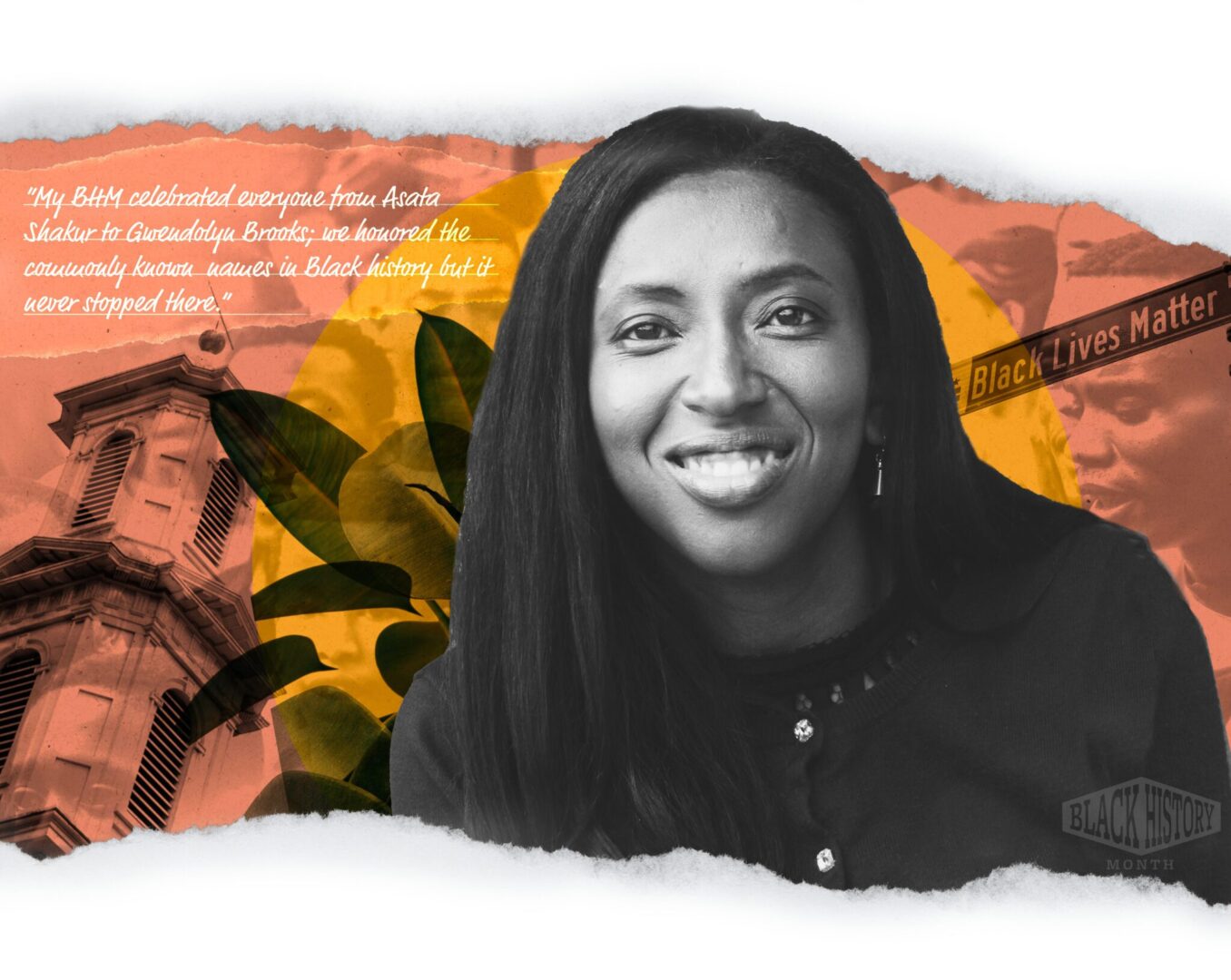
Leanna W. Lewis, MSW, LCSW
Associate Director UC Berkeley/UCSF Joint Medical Program, teaches and trains students at the Joint Medical Program and at UCSF in the Program for Medical Education for Underserved
Black History Month has always been a time of appreciation and celebration for me. I grew up in San Francisco, in the Fillmore neighborhood at a time when it was a predominantly Black community. BHM was prominent throughout our community, in school, in church, and in the community centers. These places were epicenters of vibrant BHM celebrations that connected and reflected an appreciation for the diaspora of Blackness stretching from pre-enslavement through modern, everyday heroes and sheroes.
My BHM celebrated everyone from Asata Shakur to Gwendolyn Brooks; we honored the commonly known names in Black history but it never stopped there. Because I got to experience BHM from the gaze of my Black community it was nuanced and full of the joy and richness that is the essence of the Black diaspora. More recently, as BHM has become mainstream and commercialized, I miss the personal feel of Black History Month when it was still ours and I was assured the celebration was authentic. While I appreciate the intention of the mainstream BHM, I can’t be sure today of the authenticity and the Black joy of BHM I experienced in my childhood feels muted.
Berkeley Public Health (BPH): What pronouns do you use?
Leanna W. Lewis: She/her/hers
BPH: What is your role here at Berkeley Public Health?
Lewis: I teach and train students at the Joint Medical Program and at UCSF in the Program for Medical Education for Underserved. I also work with the BPH faculty helping to facilitate the Antiracist Faculty Leadership Academy.
BPH: What does Black History Month mean to you?
Lewis: BHM has always been a time of appreciation and celebration for me. I grew up in San Francisco, in the Fillmore neighborhood at a time when it was a predominantly Black community. BHM was prominent throughout our community, in school, in church, and in the community centers. These places were epicenters of vibrant BHM celebrations that connected and reflected an appreciation for the diaspora of Blackness stretching from pre-enslavement through modern, everyday heroes and sheroes.
My BHM celebrated everyone from Asata Shakur to Gwendolyn Brooks; we honored the commonly known names in Black history but it never stopped there. Because I got to experience BHM from the gaze of my Black community it was nuanced and full of the joy and richness that is the essence of the Black diaspora. More recently, as BHM has become mainstream and commercialized, I miss the personal feel of Black History Month when it was still ours and I was assured the celebration was authentic. While I appreciate the intention of the mainstream BHM, I can’t be sure today of the authenticity, and the Black joy of BHM I experienced in my childhood feels muted.
BPH: How do you think UC Berkeley can amplify the voices of our Black community members?
Lewis: The Black people of UCB and BPH have so much to give and have limitless wisdom, insight, and of course, swag to offer the UCB community. Allowing and providing more physical and virtual spaces created with the goal of protecting and amplifying the UCB Black community is necessary if the university is legitimately committed to the UCB Black students, faculty, and staff. I would love to see financial support, physical space in multiple parts of the campus, and the investment of time provided for the UCB Black community to be seen and heard throughout UC Berkeley.